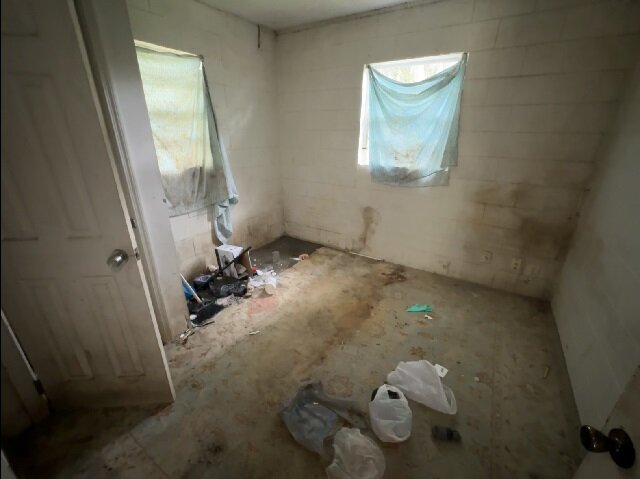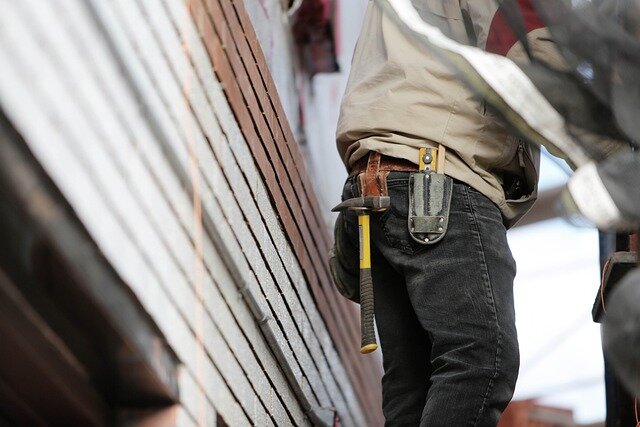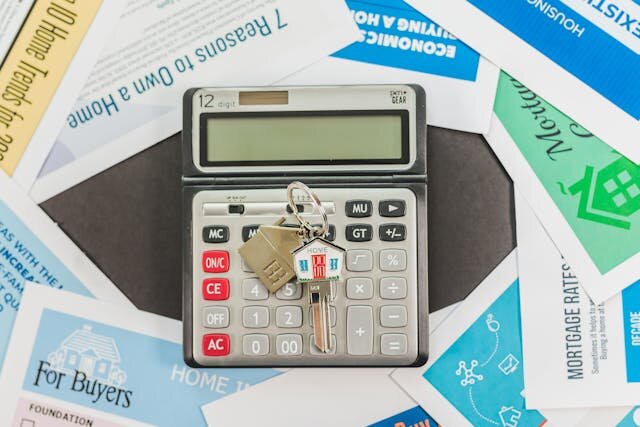Water damage is among the most common and serious problems that homeowners face.
It can affect any part of your home, from the walls to the basement, and cause a wide range of issues, including mold growth, structural damage, electrical threats, health dangers, and decreased property value.

Whether it is caused by innate disasters, plumbing perforations, faulty appliances, or human oversight, water damage can be costly and time-consuming to repair. It can also complicate the process of selling a home.
Selling a home can be confusing enough, and when you add the complications of a damaged property to the mix, the process can become nothing short of intimidating.
However, the more you know about selling an as-is home, the more comfortable you’ll be that you are making the right decisions for yourself and your family. (1)
Assess the Extent and Source of Water Damage on your Property

One of the most crucial tasks in selling a house with water damage is determining the extent and source of the problem.
Water damage can impact various aspects of your home, including the roof, walls, flooring, ceilings, plumbing, electrical systems, and more.
Leaks, floods, storms, burst pipes, defective appliances, and inadequate drainage are some of the other possible causes.
Depending on the severity and source of the water damage, you may need to take various steps to fix it or keep it from happening again.
In this section, we will cover how to analyze the degree and source of water damage and provide some practical recommendations and examples.
Check for Evidence of Water Damage
These include stains, discoloration, mold, mildew, peeling paint, warped wood, cracked tiles, drooping ceilings, and musty odors.
You should inspect every room and location on your property, including the basement, attic, crawl space, and bathrooms.
You should also evaluate the exterior of your home, including the roof, gutters, downspouts, foundation, and landscaping. If you notice any symptoms of water damage, take photos and notes.
Hire a Plumber or a Water Damage Expert

If you suspect a hidden water problem in your home, such as a leaking pipe, a malfunctioning appliance, or a damaged sewage line, you may need to call a plumber or a water damage specialist to locate and repair it.
They can utilize cameras, sensors, or probes to pinpoint the source of the water problem and assess the damage.
They can also provide an estimate of the cost and time needed to repair it.
Use a Hygrometer or Moisture Meter
These are devices that detect moisture or humidity in the air or in various materials.
You can use them to determine the moisture level in your walls, floors, ceilings, and other surfaces.
A high moisture content suggests a possible water problem. You can purchase these gadgets online or at hardware stores or have a professional perform them for you.
Repair Water Damage by Yourself or Hire a Professional Contractor

Water damage is one of the most common and costly hazards that homeowners encounter.
Natural calamities, plumbing leaks, defective appliances, or human mistakes are all potential causes.
Water damage can compromise your property’s structural integrity, beauty, and value. If you want to sell your property with water damage, you have two options: fix it yourself or engage a professional contractor.
In this section, we will offer advice on how to select the best option for your specific scenario.
Repairing water damage yourself: This alternative may be appealing if you want to save money and time or if you have some DIY abilities and expertise.
However, repairing water damage oneself can be dangerous and difficult. Before taking on this work, consider the following factors:
· The severity of the water damage
· The materials and tools required for the repair work
· The skills needed for the repair job
· The time and effort you will invest in the project
Hiring a contractor: This alternative may appear more convenient and dependable if you want to secure a high-quality and trouble-free outcome or if you lack the necessary expertise, materials, or time to repair the water damage yourself.
However, hiring a skilled contractor may be both expensive and complicated. Before hiring a professional contractor, consider the following factors:
· The reputation and certifications of the contractor
· The contract and agreement terms of the contractor
· The risks and liabilities involved in the project
Report Water Damage Issues to Potential Buyers and Avoid Legal Problems

When selling a house with water damage, it is critical to provide this information to prospective buyers in order to maintain transparency and avoid legal difficulties.
Failure to disclose such risks might result in lawsuits and financial penalties.
To guarantee a seamless selling process, approach the disclosure from various angles, including the buyer’s concerns and legal duties.
First, you will have to understand the extent of the water damage and then seek advice from water restoration experts.
The information they give you will be valuable when explaining the water damage issue to potential buyers.
The next steps will include the following:
Document the Water Damage
Take thorough pictures and videos of the impacted regions. This visual evidence will assist potential buyers in determining the amount of the damage and making informed judgments.
Additionally, keep track of any repairs or remediation attempts made to remedy the water damage.
Highlight the Preventive Steps
Along with the disclosure, highlight the efforts done to prevent future water damage.
This may include establishing waterproofing systems, repairing plumbing difficulties, or adopting drainage solutions.
Taking preemptive efforts can help to assuage fears and reassure potential buyers.
Report the Water Damage in Writing
Provide a written disclosure statement that specifically notes the existence of water damage.
Include information about the cause, the impacted areas, and any repairs or remediation efforts taken. To avoid future legal conflicts, disclose honestly and transparently.
Educate Potential Purchasers
Provide information about the potential dangers of water damage and how it affects the property’s value or structural integrity.
Provide tools or references to help customers understand how they may reduce these risks.
Consider Professional Inspections
Encourage potential purchasers to do their own inspections or employ professional inspectors to properly examine the property.
This enables them to make sound decisions based on their own assessments.
Remember, the goal is to offer potential purchasers precise and detailed water damage information.
Doing so can increase trust, avoid legal issues, and ensure a smoother selling process.
Set a Realistic Price

One of the most difficult components of selling a property with water damage is determining the suitable price.
You want to maximize your return on investment, but you must also be realistic about your property’s market value and repair costs.
Selling your home too expensive will repel potential purchasers, while selling it too low could result in a loss.
How do you strike the right mix between realism and attractiveness?
Here are some tips to help you price your water-damaged property:
Obtain a Professional Appraisal
A skilled appraiser can provide you with an unbiased estimate of your property’s current market value based on its location, size, condition, and characteristics.
They can also consider the extent and severity of the water damage and how it impacts your property’s functionality and aesthetics.
An appraisal can assist you in establishing a realistic price range for your property and will serve as a trustworthy reference during discussions with purchasers.
Compare Your Property to Similar Ones in the Region
Another method for determining the market worth of your property is to look at recent sales of comparable properties in your neighborhood or region.
You can utilize internet resources or speak with a real estate agent to determine the average price per square foot, number of days on the market, and final sale price of properties with similar attributes and conditions.
This can help you understand the demand and competition for your home, allowing you to change your asking price accordingly.
Highlight the Positive Features of Your Home
Even if your property suffers water damage, it may still have some desirable aspects for purchasers.
For example, it could have a large layout, a beautiful view, a handy location, or a desired neighborhood. You should accentuate these good elements in your listing and marketing materials and demonstrate your property’s potential to purchasers.
You can also utilize staging tactics to make your home more inviting and appealing, such as decluttering, cleaning, painting, and adding accessories.
Consider the Cost and Feasibility of Repair

Depending on the extent and source of the water damage, you may need to make some repairs before putting your home for sale.
This may include repairing leaks, replacing damaged floors, walls, or ceilings, removing mold and mildew, and restoring electrical and plumbing systems.
You must assess the cost and benefit of these repairs to determine whether they will raise the value and appeal of your property or whether they will be too expensive and time-consuming to complete.
If you decide to sell my house fast Pine Hills, as-is, you must factor in the cost of repairs that the buyer will have to make and drop your asking price appropriately.
Be Flexible and Realistic About Your Expectations
Selling a property with water damage can be a lengthy and arduous process, and you may not receive the price you had hoped for.
You must be willing to bargain with buyers and accept certain compromises and concessions.
You may also face legal and financial challenges, such as declaring the water damage, obtaining licenses and inspections, and dealing with insurance claims.
You should speak with a lawyer and an accountant to ensure that you comply with all requirements and obligations while also protecting your interests.
You should also maintain an open mind and a positive attitude, focusing on the advantages of selling your house and moving on to the next one.
Market your Property Effectively by Emphasizing its Strengths

When it comes to efficiently marketing your home and highlighting its benefits, you must consider numerous crucial tactics.
First and foremost, it is critical to grasp your property’s distinct selling qualities, such as its location, facilities, or distinctive features. Identifying these assets allows you to design your marketing efforts to highlight them in the most convincing way.
One useful strategy is to produce high-quality visual content, such as professional images or virtual tours, that accurately depict the property’s best characteristics.
This gives potential purchasers a clear and appealing view of what your property has to offer.
Furthermore, using online platforms and social media can significantly increase your reach and attract a larger audience.
Use popular real estate websites, social media platforms, and online classifieds to publicize your property listing.
Create interesting and informative descriptions that highlight your property’s best features, utilizing descriptive language to construct a clear picture for potential buyers.
Consider developing a dedicated website or landing page for your property, where you can provide specific information, extra images, and even virtual staging to demonstrate the space’s potential.
This allows potential buyers to visualize themselves living in the house and emphasizes its qualities. In terms of content, consider authoring blog entries or articles that offer valuable insights into your property’s capabilities.
For example, if your property has a lovely backyard, you could create a blog post about creating a relaxing outdoor refuge or gardening tips.
This not only establishes you as an expert in the subject but also draws potential purchasers who are looking for those precise features.
When presenting information, a numbered list can effectively offer detailed information in a clear and organized format.
For example, if your home has a newly rebuilt kitchen, you could make a numbered list of the best features, such as cutting-edge appliances, plenty of storage space, or a contemporary design.
Finally, do not underestimate the value of word-of-mouth marketing.
Encourage satisfied prior clients or neighbors to spread the word about your property since personal recommendations may have a huge impact on the real estate market.
Remember that each property is unique, so design your marketing strategy to highlight its distinct characteristics.
You can effectively promote and attract potential buyers by implementing these methods and presenting your property in the best possible light.
Negotiate with Purchasers and Manage Contingencies Effectively

When selling a house with moisture or flooding issues, negotiating with purchasers and efficiently managing inspections and contingencies is critical.
To create confidence in potential purchasers, the seller must address these issues in a clear and proactive manner.
Understand the Buyer’s Perspective
It is critical to empathize with the buyer’s fears about water damage.
Recognize their concerns about potential structural issues, mold growth, and the overall effect on the property’s value.
By exhibiting your comprehension, you can lay the groundwork for successful discussions.
Price Considerations
Adjusting the listed price to reflect water damage is a popular negotiation tactic.
Consider obtaining a professional evaluation or talking with a homeowner who has sold properties with comparable concerns.
This might assist you in selecting a reasonable and competitive price that takes into account the water damage.
Disclose and Document
Full disclosure of the water damage history is critical.
Provide full documentation, including any repair or remediation work that has been completed.
This transparency fosters confidence and enables purchasers to make informed judgments.
Highlight Remediation Efforts
Showcase the methods used to repair the water damage. Provide documentation for professional inspections, repairs, and certificates obtained.
This assures customers that the problem has been adequately addressed and managed.
Provide Inspection Opportunities
When you sell your house to cash home buyers in Pine Hills, allow prospective purchasers to perform thorough inspections.
Encourage them to hire their own experts to determine the scope of the water damage and its impact on the property.
This transparency displays your readiness to cooperate and gives buyers a clear picture of the issue.
Contingency Planning
Be prepared for unexpected events that may emerge throughout the negotiation process.
Buyers may seek extra repairs and credits or even cancel the transaction altogether.
Be willing to negotiate and assess the feasibility and cost-effectiveness of each request.
Remember that each negotiation is unique, so approach it with flexibility and open communication.
Addressing concerns, giving documentation, and remaining candid throughout the process might improve the likelihood of successfully selling your water-damaged house.
Close the Transaction and Transfer the Property

You have found a reputable We Buy Houses Pine Hills firm for your water-damaged property and accepted a fair price.
Congratulations! However, the procedure is far from over. You still need to complete the transaction and smoothly transfer the property to the new owner.
This section will walk you through the steps and advise you on how to safely close and transfer your water-damaged property. Here are some of the things to consider:
· Prepare all necessary documentation.
· Come up with a closing date and location.
· Transfer all the property utilities and services to the buyer.
· Move out and clean up anything that belongs to you before the closing date.
· Attend the closing and meet with the buyer and any other involved parties. In this last meeting, bring the house keys, documents, and any other items you agreed to give to the buyer.
You must sign closing documents such as the deed at the closing, and then you will receive the payment.
You can hand over the keys to the buyer once you verify the payment and all the documents are recorded. Remember, when you sell your house to a We Buy Houses Winter Garden FL or Pine Hills cash buyers, the closing process is simpler, and the documents involved are minimal.
You can sell your water-damaged home within ten days and receive the payment from the buyer immediately.
